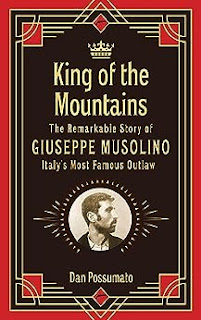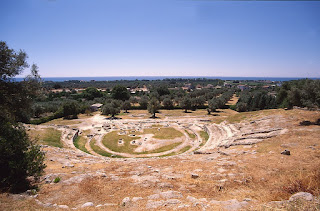Vengeful killer who became an unlikely folk hero
 |
| Giuseppe Musolino spent most of his life in jail |
He was 79 years old when he passed away, having been just 22 when he was sentenced to 21 years in prison for an attempted murder he swore he did not commit, with the evidence against him no better than circumstantial.
He escaped after just three months and embarked upon a killing spree in which he may have murdered as many as nine individuals and attempted the murder of several others, most of whom had played a part in what he saw as a corrupt trial.
The revenge killings took place during his two years and nine months on the run, during which Calabrians took to him as a symbolic figure, representing the people of an impoverished region against a state system rigged against them.
His story captured the imagination of not only Italians - southern Italians in particular - but of the wider world, with readers of newspapers in Europe and the United States eagerly awaiting the next update.
It all began with a brawl in Santo Stefano, the village in the Aspromonte mountains, a short distance from the city of Reggio Calabria, where Musolino had been born in 1876. Musolino, a carpenter and woodcutter by trade, was drinking in his father’s tavern when he and his friend, Antonio Filastò, became involved in an argument with Vincenzo and Stefano Zoccali, two brothers from one of the village’s more powerful families, reputed to be part of a picciotteria, a criminal gang of the type that would later evolve into the region’s fearsome mafia, known as the ‘Ndrangheta.
.jpg) |
| An artist's imagined scene of the moment Musolino was captured |
The attempted murder charge came from what happened a day or two later when Zoccali’s family claimed a shot was fired at him at the stable where he kept horses. The assailant remained out of view behind a wall but witnesses testified to having heard Musolino shout and also to have found a hat belonging to him at the scene. They also said he had sworn a vendetta against the Zoccalis, which at the time was seen as a criminal offence.
A complaint was lodged with the police, although by the time they had decided to arrest Musolino he had long disappeared, having been tipped off that he was a wanted man. It took police six months to find him.
When his trial took place in Reggio Calabria, it was before a judge whose political associations gave him every encouragement to find against Musolino, while witnesses were thought to have either been bribed or intimidated by the Zoccali family to commit perjury. The judge, meanwhile, denied Musolino’s own lawyers the chance to call any witnesses who would testify for his innocence and sentenced him to 21 years in jail with hard labour, handing his friend, Antonio Filastò, a seven-year term.
Musolino was led away in a fury, shouting that if he had not sworn a vendetta against the Zoccalis, he would do so now. He also vowed revenge against all those who had given evidence against him, promising to kill them all as well as the prosecutor and the judge.
 |
| King of the Mountains is one of several books about Musolino |
Musolino hid in the Aspromonte mountains, one by one working through his list of targets, committing five murders in his first eight months out of captivity and continuing to pursue his goal of revenge for almost three years. He found local people only too willing to help him, giving him food and hiding places despite a bounty of 5,000 lire being offered to anyone who caught him and turned him over to the police.
Many felt his trial had simply been a representation of the attitudes towards the south held by many northern Italians, who had led the fight to unify the country on behalf of the wealthy Kingdom of Sardinia but had subsequently disparaged southern Italians as backward and ignorant. There was a particular sense of betrayal in Santo Stefano, home of the Romeo family, who were patriots and major supporters of unification in Calabria, helping Garibaldi conquer the region and even joining him on his march north to Naples.
During his time on the run, Musolino, who claimed to be descended from French nobility on the side of his mother, wrote to Italy’s new king, Victor Emmanuel III, appealing for help for the people of Calabria. Eventually, he decided to leave Calabria and head north, hoping at some point to be able to meet Victor Emmanuel in person and ask to be pardoned.
 |
| Musolino hoped to ask Victor Emmanuel III for a pardon |
Walking along a country lane in October 1901, he caught sight of three carabinieri officers, whom he assumed were looking for him, and ran away. They saw him and pursued him, catching up with him when he tripped over a wire supporting a grapevine and fell.
Musolino was transferred by train to a prison in Catanzaro in Calabria on October 24, 1901 to await a second trial, which took place many hundred of miles away from his homeland in Lucca, Tuscany. He was sentenced to life imprisonment and taken to Portolongone prison near Livorno on the Tuscan coast, where he remained until 1946.
In that year, he was declared to be mentally ill and transferred to the psychiatric hospital in Reggio Calabria, where he died on January 22, 1956.
Giuseppe Musolino’s story had a huge impact worldwide, with mass circulation newspapers such as Corriere della Sera and Il Mattino at home giving it extensive coverage, along with international journals including The Times in London, Le Figaro in Paris and the New York Times. Their reporting, which included tales of stealing from the rich to give money to the poor, convinced some readers that he was a romantic figure akin to the heroic outlaw of English folklore, Robin Hood.
A film, Il Brigante Musolino (1950), directed by Mario Camerini and starring Amedeo Nazzari, told the story to cinema audiences. The celebrated poet Giovanni Pascoli wrote an ode to him and the English writer Norman Douglas devoted a whole chapter of his book, Old Calabria, to his tale, which also inspired recording artists in many genres to write wrote songs about him. Other books include King of the Mountains: The Remarkable Story of Giuseppe Musolino, Italy's Most Famous Outlaw, by Dan Possumato.
 |
| Santo Stefano in Aspromonte attracts winter visitors to its nearby ski slopes |
Santo Stefano in Aspromonte, birthplace of Giuseppe Musolino, is a village perched on a rocky spur in a mountainous area of the province of Reggio Calabria. The area, which falls within the area of the beautiful Aspromonte National Park, has attractions for summer and winter stays, the mountain areas dotted with pathways and stairways for trekking and the ski slopes of Gambarie nearby. The village itself boasts an historic centre of nooks and crannies, steep staircases, pretty palaces and fountains, as well as the remains of the ancient Abbey of San Giovanni a Castaneto. The area is renowned for its production of oil, cereals and fruit, while wild mushrooms and chestnuts trees abound in the nearby woodlands.
 |
| The remains of an ancient Greek theatre in the vicinity of the Calabrian resport of Locri |
The coastal city of Locri, on Calabria’s Ionian Sea coast, was originally a Greek colony founded at the end of the eighth century BC by Greek refugees who settled on the coast. It became a major centre in the political and artistic life of Magna Graecia, the name the Romans gave to the Greek-speaking areas of southern Italy. The modern Locri has attractions that include a museum and archaeological park that is home to ancient Greek ruins and artifacts, the scenic Lungomare di Locri and the Monument to the Five Martyrs of Gerace, dedicated to five Locride citizens who were executed in the Risorgimento for having fought for freedom. Locri has more than 12,000 inhabitants, is an important administrative and cultural centre on the Ionian Coast and is only 90 minutes away from the International Airport of Lamezia Terme.
Also on this day:
1506: The founding of the Papal Swiss Guard
1889: The birth of supercentenarian Antonio Todde
1893: The birth of mobster Frankie Yale
2005: The death of veteran soldier Carlo Orelli
No comments:
Post a Comment